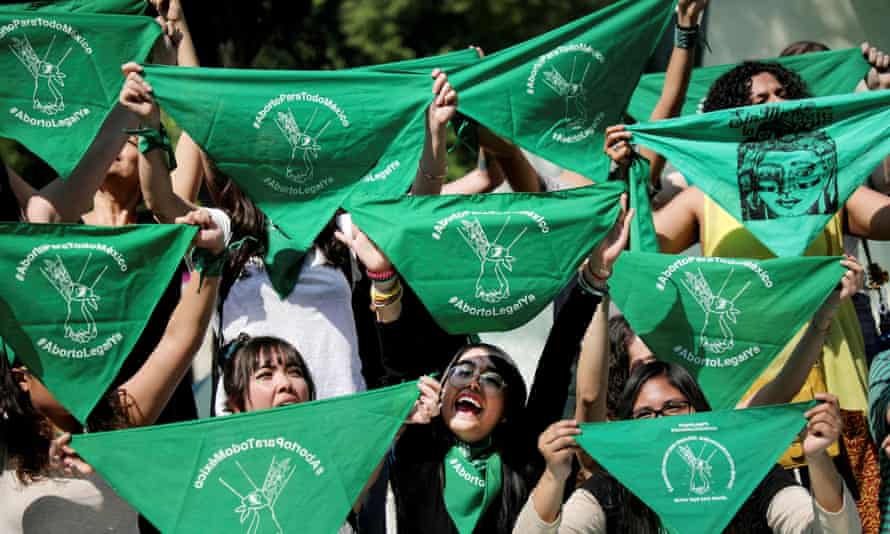Criminalising abortion is now unconstitutional in Mexico. The country’s Supreme Court ruled this unanimously on the last 7 September. It is an astronomical win for women rights activists in Mexico and feminists across the globe. The decision can impact the rights of sixty-four million Mexican females, they are 51% of the country’s population, according to World Bank data. A study conducted by the Guttmacher Institute estimated that one million abortions were performed in 2009 in Mexico, most in unsafe conditions.
Feminists took to the streets of Coahuila State Capital, Saltillo, wearing green bandanas symbolising the pro-choice movement and shouted with joy and excitement “abortion is no longer a crime!” Celebrations over the whole country used the hashtags #AbortoLegalMexico and #EsLey.

Karla Cihuatl, a 26-year-old member of the organisation Frente Feminista in Saltillo, said that “this step has broken the stigma a little.” Celebrating this win, activists intend to keep pressing for overall legalisation. “We are very happy that abortion has been decriminalised, and now we want it to be legal”, tells Cihuati.
Karla Michelle Salas, a lawyer who represents people charged with abortion-related crimes, says that women in Mexico are not tried for abortion, they are tried for homicide, reports The Guardian. Salas once represented a woman who was charged for abortion and later homicide, sentenced for 16 years in prison, after suffering a miscarriage in the bathroom at her place of work.

The Supreme Court decision unanimously invalidated Coahuila’s law that has imposed one to three years of imprisonment “on a woman who voluntarily performs her abortion or on the person who causes her to have an abortion with consent”. The court has eleven ministers, three out of them are women.
Following this ruling, all Mexican states must modify their laws to comply with the Federal Constitution. Abortion is legal in only four out of thirty-two states in Mexico and this ruling, while not legalising abortions, has opened the pathway to legalisation, setting a binding precedent for judges across the country. Should any state charge, prosecute or punish any woman for having an abortion will be defying the Constitution. The ruling also sets precedent for those women who are currently accused or imprisoned for seeking abortions to be released immediately and have all charges dropped.
The president of the Supreme Court, Arturo Zaldívar, described the ruling as “a watershed moment for all women, especially the most vulnerable.”
“Today is a historic day for the rights of all Mexican women”, Zaldívar said.
Following many cases like this and inspired by activists in Argentina, where activism led to the legalisation of abortion just last year, Mexican women engaged in their activism to demand change, including but not limited to anti-abortion laws existing in much of the country’s cities. On 28 September 2020, despite being met with police lines and tear gas, activists marched through the streets of the City of Mexico demanding the legalisation of abortion. That day is established as the International Safe Abortion Day.
Decriminalisation is a step in the right direction; a victory for these feminist movements after being disappointed by the country’s President, López Obrador, who has cut funds for women’s shelters among other policies.
Antiabortion protestors gathered outside The Supreme Court on the day of the ruling. Mexico’s conservative party, The National Action Party, also stood against the decriminalisation saying: “We are in favour of defending life from the moment of conception until natural death.”
Mexico has the second-largest Catholic population in the world with approximately a hundred million Catholics. The Catholic Church continues to oppose all forms of abortion procedures. The day before the ruling, the Church released a statement in the magazine Desde La Fe urging the judges: “From the Faith, don’t create a huge setback just to please an ideology in vogue, or due to peer pressure”. Even with three-quarters of Mexicans identifying as Catholics, the State remains secular, and the Church’s influence is decreasing.
This ruling comes just after the abortion ban was announced in Texas earlier in the month. On 1 September, Texas Governor, Greg Abbott, signed off on a ban, prohibiting resident women from having abortions any time after six weeks of pregnancy. At that point, most women don’t even know they are pregnant yet. This law is considered the most extreme and strictest reproductive law to exist as it makes no exceptions for pregnancies that resulted from rape or incest.
The law is categorised as a civil violation, permitting private citizens to sue abortion providers and anyone who assists a woman in getting an abortion, including drivers, financial providers, and abortion advocates. These citizens can then in turn be rewarded with at least ten thousand dollars.
The burning question lies, with Texas being so close to Mexico, would it be safer for Texan women to seek abortions in Mexico?














